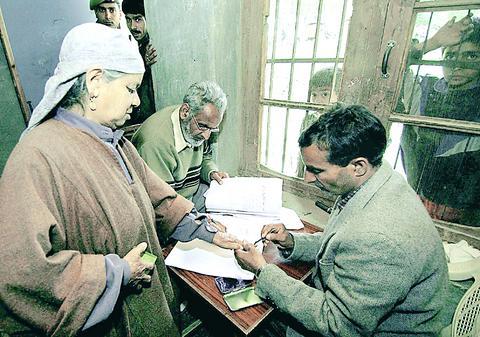Indians braved attacks by separatists and communists as they started voting yesterday in parliamentary elections expected to return Prime Minister Atal Bihari Vajpayee's governing coalition to power for another five years. At least 11 people were killed and 18 injured in the election-day violence.
The massive polls in the world's largest democracy, with more than 660 million registered voters, will be staggered in five phases over three weeks ending May 10, with vote-counting starting three days later.

PHOTO: AFP
Vajpayee's National Democratic Alliance headed into the elections with a booming economy likely to grow more than 8 percent this year and prospects for peace with nuclear rival Pakistan at their highest level in years.
A major issue for peace talks with Pakistan -- which were to resume after the elections -- is the two nations' conflicting claims to Kashmir, which is divided between them.
Militants opposed to India's control over portions of Kashmir were blamed for fatally shooting a paramilitary soldier guarding a polling station and a separate bomb attack in the region that wounded six civilians, including two poll workers.
Islamic militants say the elections legitimize what they see as India's occupation of the Himalayan region, and have threatened attacks on anyone participating in the polls.
A car filled with Indian journalists and human rights activists on their way to monitor polling stations exploded when it ran over a land mine in Kashmir. The driver and a human rights activist -- Asiya Geelani of the Association of Parents of Disappeared Persons -- were killed and four others were wounded.
More than 65,000 people have been killed and some 8,000 people have disappeared in Kashmir since an insurgency began in 1989 by Islamic militants fighting for the enclave's independence.
Maoist rebels also have ordered an election boycott in the isolated northeastern states of Jharkhand and Bihar.

AIR SUPPORT: The Ministry of National Defense thanked the US for the delivery, adding that it was an indicator of the White House’s commitment to the Taiwan Relations Act Deputy Minister of National Defense Po Horng-huei (柏鴻輝) and Representative to the US Alexander Yui on Friday attended a delivery ceremony for the first of Taiwan’s long-awaited 66 F-16C/D Block 70 jets at a Lockheed Martin Corp factory in Greenville, South Carolina. “We are so proud to be the global home of the F-16 and to support Taiwan’s air defense capabilities,” US Representative William Timmons wrote on X, alongside a photograph of Taiwanese and US officials at the event. The F-16C/D Block 70 jets Taiwan ordered have the same capabilities as aircraft that had been upgraded to F-16Vs. The batch of Lockheed Martin

GRIDLOCK: The National Fire Agency’s Special Search and Rescue team is on standby to travel to the countries to help out with the rescue effort A powerful earthquake rocked Myanmar and neighboring Thailand yesterday, killing at least three people in Bangkok and burying dozens when a high-rise building under construction collapsed. Footage shared on social media from Myanmar’s second-largest city showed widespread destruction, raising fears that many were trapped under the rubble or killed. The magnitude 7.7 earthquake, with an epicenter near Mandalay in Myanmar, struck at midday and was followed by a strong magnitude 6.4 aftershock. The extent of death, injury and destruction — especially in Myanmar, which is embroiled in a civil war and where information is tightly controlled at the best of times —

China's military today said it began joint army, navy and rocket force exercises around Taiwan to "serve as a stern warning and powerful deterrent against Taiwanese independence," calling President William Lai (賴清德) a "parasite." The exercises come after Lai called Beijing a "foreign hostile force" last month. More than 10 Chinese military ships approached close to Taiwan's 24 nautical mile (44.4km) contiguous zone this morning and Taiwan sent its own warships to respond, two senior Taiwanese officials said. Taiwan has not yet detected any live fire by the Chinese military so far, one of the officials said. The drills took place after US Secretary

THUGGISH BEHAVIOR: Encouraging people to report independence supporters is another intimidation tactic that threatens cross-strait peace, the state department said China setting up an online system for reporting “Taiwanese independence” advocates is an “irresponsible and reprehensible” act, a US government spokesperson said on Friday. “China’s call for private individuals to report on alleged ‘persecution or suppression’ by supposed ‘Taiwan independence henchmen and accomplices’ is irresponsible and reprehensible,” an unnamed US Department of State spokesperson told the Central News Agency in an e-mail. The move is part of Beijing’s “intimidation campaign” against Taiwan and its supporters, and is “threatening free speech around the world, destabilizing the Indo-Pacific region, and deliberately eroding the cross-strait status quo,” the spokesperson said. The Chinese Communist Party’s “threats